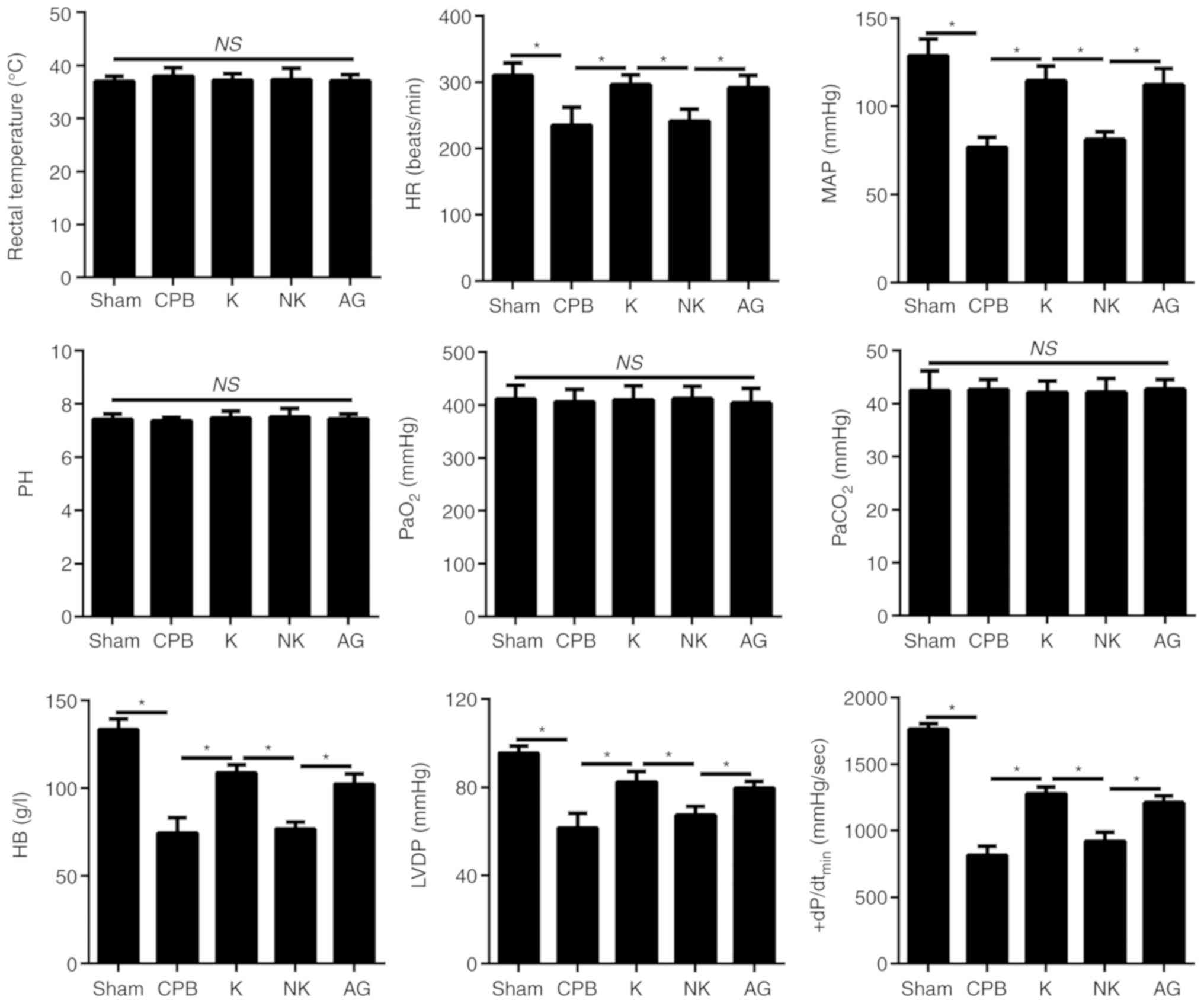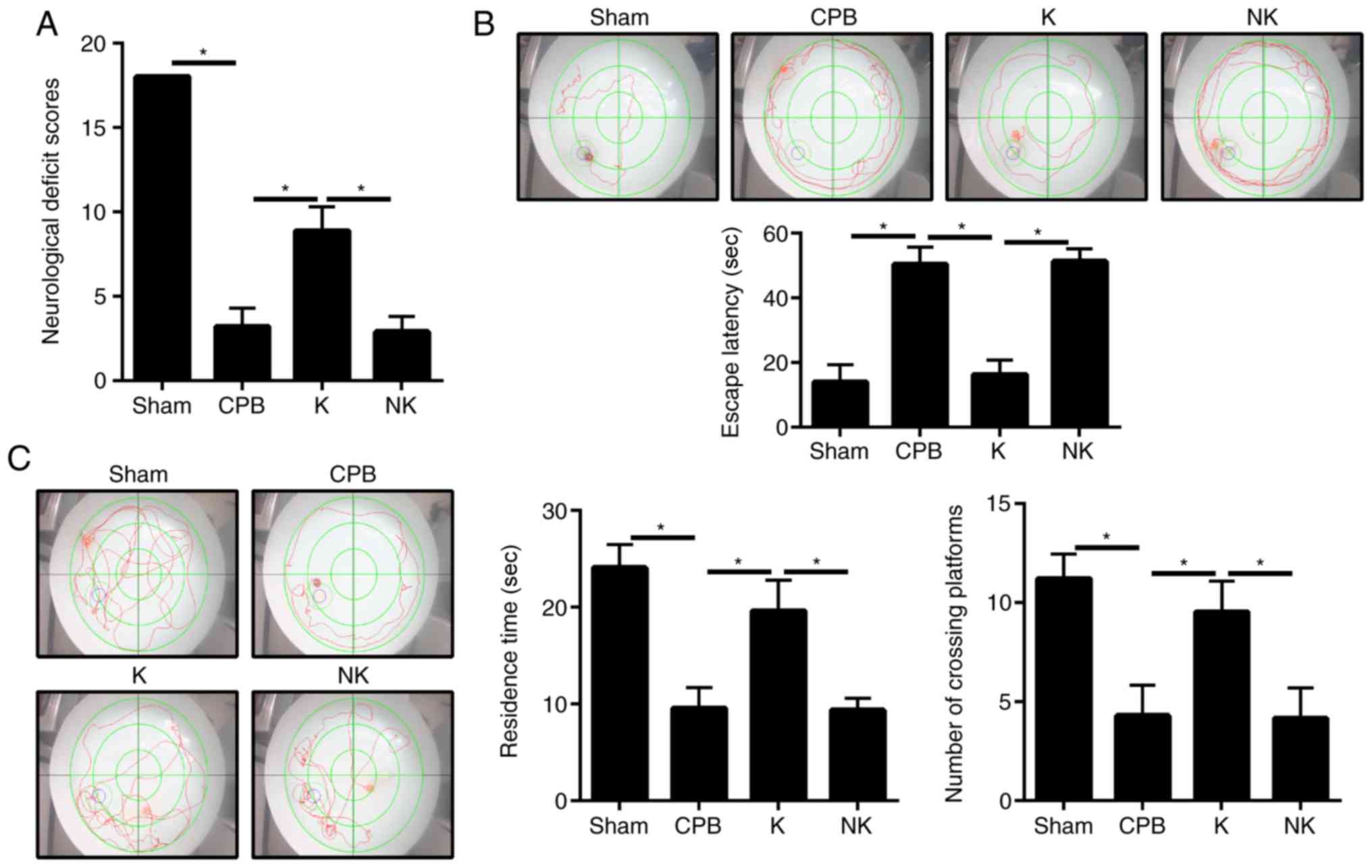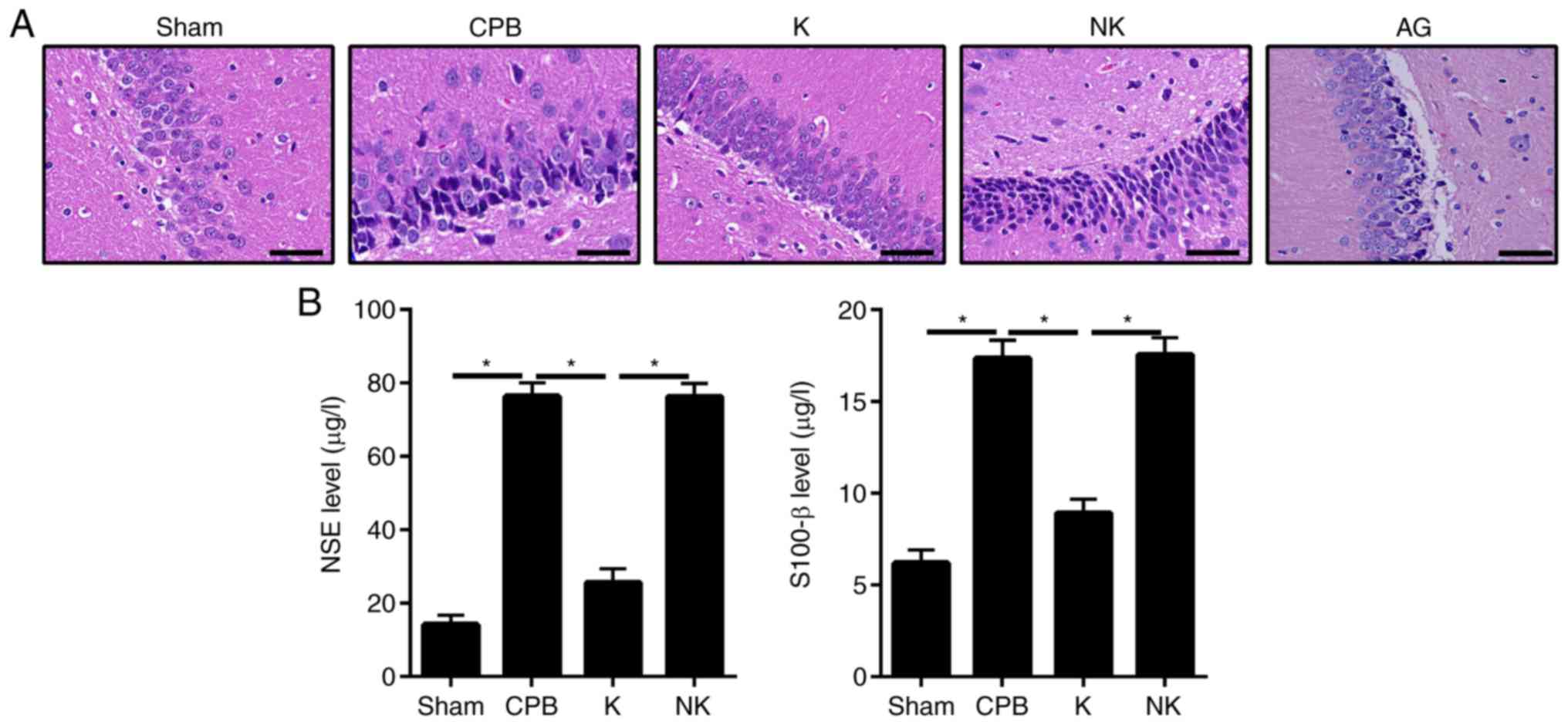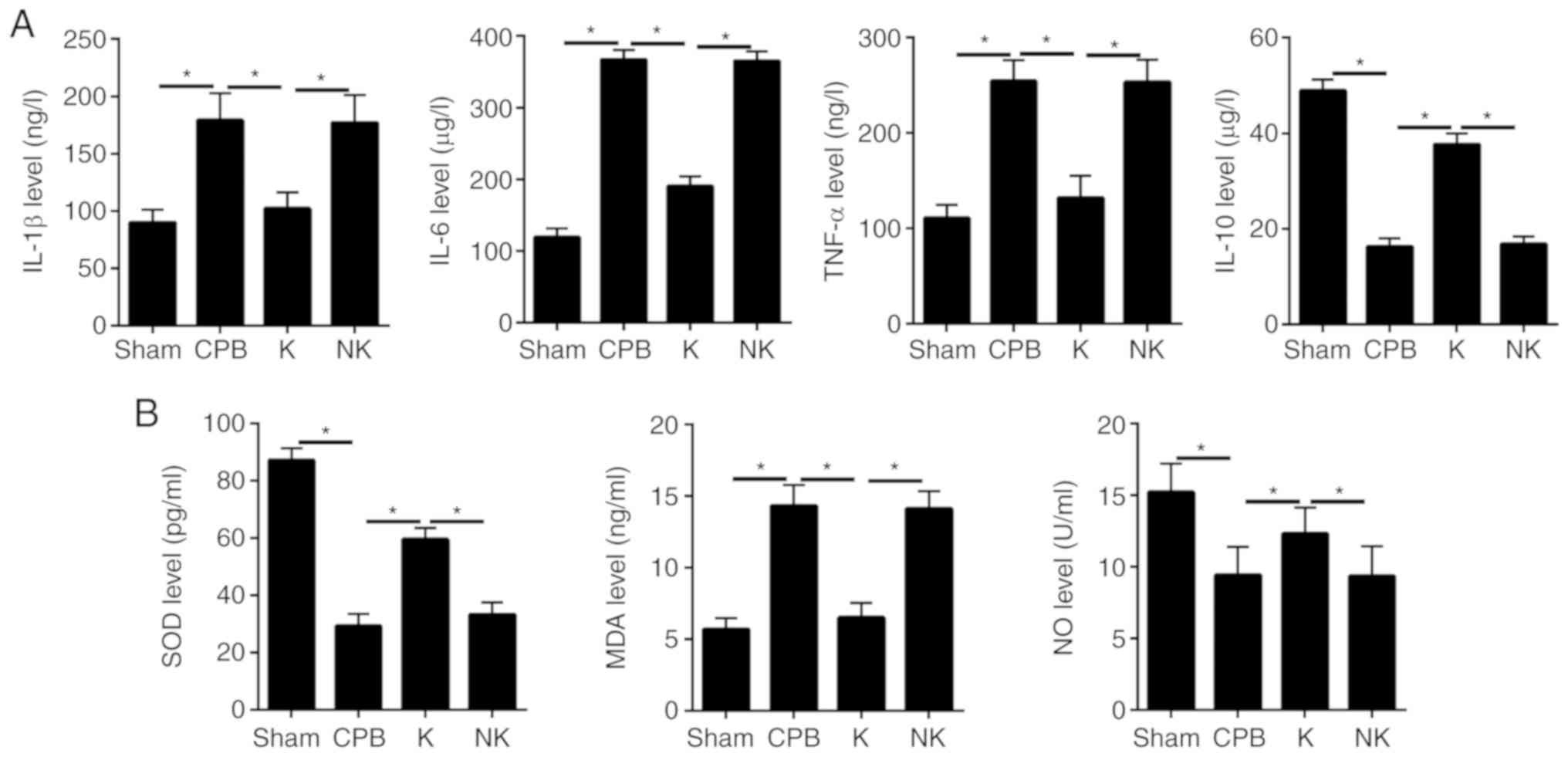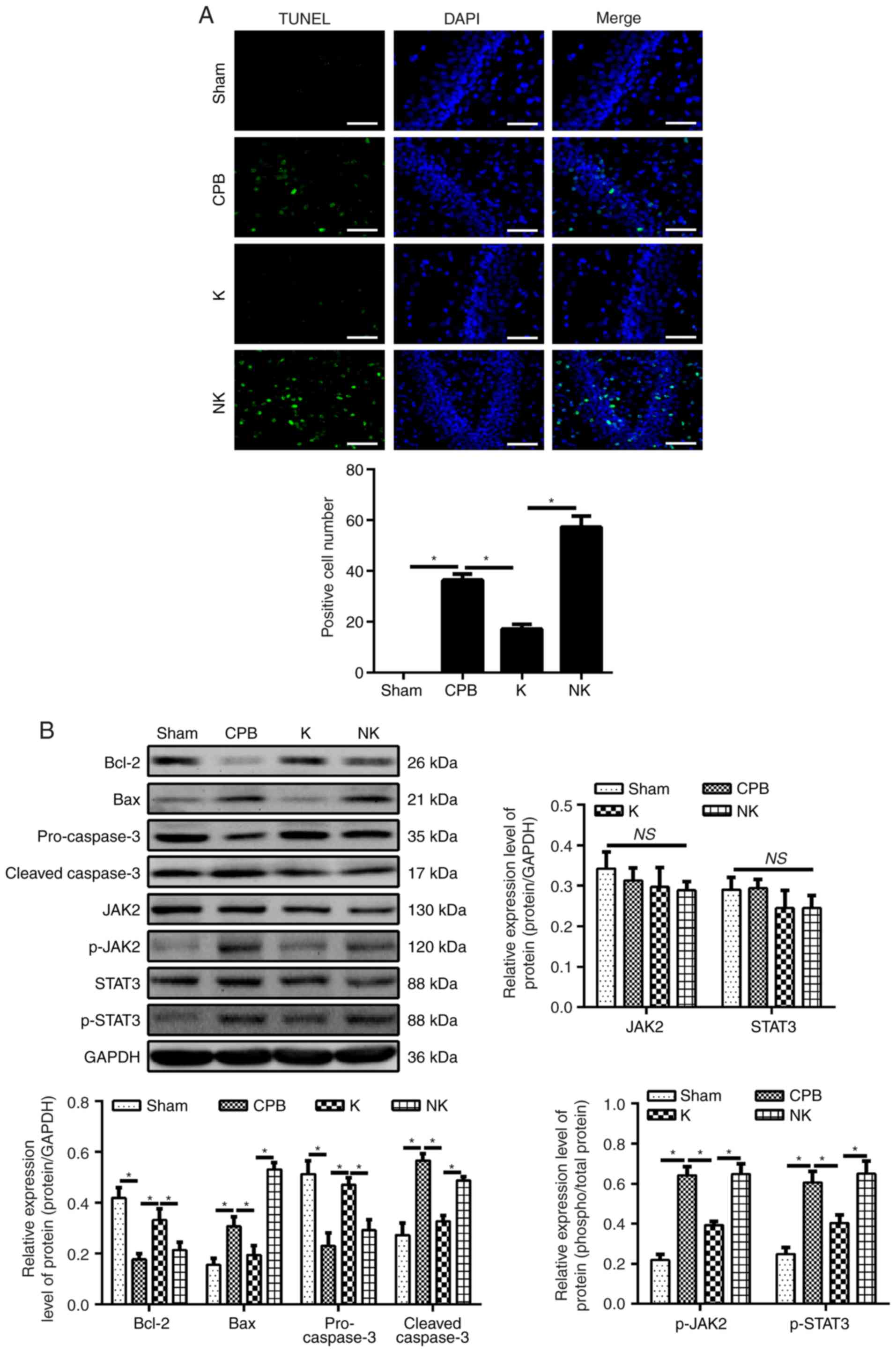|
1
|
Arrowsmith JE, Grocott HP, Reves JG and
Newman MF: Central nervous system complications of cardiac surgery.
Br J Anaesth. 84:378–393. 2000. View Article : Google Scholar : PubMed/NCBI
|
|
2
|
Evered L, Scott DA, Silbert B and Maruff
P: Postoperative cognitive dysfunction is independent of type of
surgery and anesthetic. Anesth Analg. 112:1179–1185. 2011.
View Article : Google Scholar : PubMed/NCBI
|
|
3
|
Steinmetz J and Rasmussen LS:
Peri-operative cognitive dysfunction and protection. Anaesthesia.
71(Suppl 1): pp. S58–S63. 2016, View Article : Google Scholar
|
|
4
|
Noctor G, Lelarge-Trouverie C and Mhamdi
A: The metabolomics of oxidative stress. Phytochemistry. 112:33–53.
2015. View Article : Google Scholar
|
|
5
|
Zakkar M, Guida G, Suleiman MS and
Angelini GD: Cardiopulmonary bypass and oxidative stress. Oxid Med
Cell Longev. 2015.189863:2015.
|
|
6
|
Yang L, Shah K, Wang H, Karamyan VT and
Abbruscato TJ: Characterization of neuroprotective effects of
biphalin, an opioid receptor agonist, in a model of focal brain
ischemia. J Pharmacol Exp Ther. 339:499–508. 2011. View Article : Google Scholar : PubMed/NCBI
|
|
7
|
Shen J, Sun LN, Wu LP and Xia Q: Mito
K(ATP) and kappa-opioid receptor mediate the neuroprotective effect
of limb ischemic post-conditioning on rat brain
ischemia/reperfusion injury. Zhongguo Ying Yong Sheng Li Xue Za
Zhi. 25:368–372. 2009.In Chinese. PubMed/NCBI
|
|
8
|
Hiramatsu M, Murai M and Kameyama T:
Different modulation of cholinergic neuronal systems by dynorphin A
(1-13) in carbon monoxide-exposed mice. Biochem Pharmacol.
57:1321–1329. 1999. View Article : Google Scholar : PubMed/NCBI
|
|
9
|
Olianas MC, Dedoni S, Ambu R and Onali P:
Agonist activity of N-desmethylclozapine at delta-opioid receptors
of human frontal cortex. Eur J Pharmacol. 607:96–101. 2009.
View Article : Google Scholar : PubMed/NCBI
|
|
10
|
Fei R, Zhang Y, Wang S, Xiang T and Chen
W: α7 nicotinic acetylcholine receptor in tumor-associated
macrophages inhibits colorectal cancer metastasis through the
JAK2/STAT3 signaling pathway. Oncol Rep. 38:2619–2628. 2017.
View Article : Google Scholar : PubMed/NCBI
|
|
11
|
Shi S, Liang D, Bao M, Xie Y, Xu W, Wang
L, Wang Z and Qiao Z: Gx-50 inhibits neuroinflammation via α7 nAChR
activation of the JAK2/STAT3 and PI3K/AKT pathways. J Alzheimers
Dis. 50:859–871. 2016. View Article : Google Scholar
|
|
12
|
Hu GQ, Du X, Li YJ, Gao XQ, Chen BQ and Yu
L: Inhibition of cerebral ischemia/reperfusion injury-induced
apoptosis: Nicotiflorin and JAK2/STAT3 pathway. Neural Regen Res.
12:96–102. 2017. View Article : Google Scholar : PubMed/NCBI
|
|
13
|
Silverman J and Muir WW III: A review of
laboratory animal anesthesia with chloral hydrate and chloralose.
Lab Anim Sci. 43:210–216. 1993.PubMed/NCBI
|
|
14
|
Garcia JH, Wagner S, Liu KF and Hu XJ:
Neurological deficit and extent of neuronal necrosis attributable
to middle cerebral artery occlusion in rats. Statistical validation
Stroke. 26:627–634; discussion 635. 1995.
|
|
15
|
Bederson JB, Pitts LH, Tsuji M, Nishimura
MC, Davis RL and Bartkowski H: Rat middle cerebral artery
occlusion: Evaluation of the model and development of a neurologic
examination. Stroke. 17:472–476. 1986. View Article : Google Scholar : PubMed/NCBI
|
|
16
|
Satriotomo I, Bowen KK and Vemuganti R:
JAK2 and STAT3 activation contributes to neuronal damage following
transient focal cerebral ischemia. J Neurochem. 98:1353–1368. 2006.
View Article : Google Scholar : PubMed/NCBI
|
|
17
|
Lu Y, Zhou J, Xu C, Lin H, Xiao J, Wang Z
and Yang B: JAK/STAT and PI3K/AKT pathways form a mutual
transactivation loop and afford resistance to oxidative
stress-induced apoptosis in cardio-myocytes. Cell Physiol Biochem.
21:305–314. 2008. View Article : Google Scholar
|
|
18
|
Xie HF, Xu RX, Wei JP, Jiang XD and Liu
ZH: P-JAK2 and P-STAT3 protein expression and cell apoptosis
following focal cerebral ischemia-reperfusion injury in rats. Nan
Fang Yi Ke Da Xue Xue Bao. 27:208–211. 2182007.In Chinese.
|
|
19
|
Katz MG, Fargnoli AS, Yarnall C, Perez A,
Isidro A, Hajjar RJ and Bridges CR: Technique of complete heart
isolation with continuous cardiac perfusion during cardiopulmonary
bypass: New opportunities for gene therapy. J Extra Corpor Technol.
50:193–198. 2018.PubMed/NCBI
|
|
20
|
Dimarakis I: Miniaturized cardiopulmonary
bypass in adult cardiac surgery: A clinical update. Expert Rev
Cardiovasc Ther. 14:1245–1250. 2016. View Article : Google Scholar : PubMed/NCBI
|
|
21
|
Melchior RW, Sutton SW, Harris W and
Dalton HJ: Evolution of membrane oxygenator technology for
utilization during pediatric cardiopulmonary bypass. Pediatric
Health Med Ther. 7:45–56. 2016. View Article : Google Scholar : PubMed/NCBI
|
|
22
|
Sukumaran V, Tsuchimochi H, Fujii Y,
Hosoda H, Kangawa K, Akiyama T, Shirai M, Tatsumi E and Pearson JT:
Ghrelin Pre-treatment attenuates local oxidative stress and end
organ damage during cardiopulmonary bypass in anesthetized rats.
Front Physiol. 9:1962018. View Article : Google Scholar : PubMed/NCBI
|
|
23
|
Wimmer-Greinecker G, Matheis G, Brieden M,
Dietrich M, Oremek G, Westphal K, Winkelmann BR and Moritz A:
Neuropsychological changes after cardiopulmonary bypass for
coronary artery bypass grafting. Thorac Cardiovasc Surg.
46:207–212. 1998. View Article : Google Scholar : PubMed/NCBI
|
|
24
|
Ardianto C, Yonemochi N, Yamamoto S, Yang
L, Takenoya F, Shioda S, Nagase H, Ikeda H and Kamei J: Opioid
systems in the lateral hypothalamus regulate feeding behavior
through orexin and GABA neurons. Neuroscience. 320:183–193. 2016.
View Article : Google Scholar : PubMed/NCBI
|
|
25
|
Minowa S, Ishihara S, Tsuchiya S, Horie S,
Watanabe K and Murayama T: Involvement of glutamate and
gamma-amino-butyric acid receptor systems on gastric acid secretion
induced by activation of kappa-opioid receptors in the central
nervous system in rats. Br J Pharmacol. 138:1049–1058. 2003.
View Article : Google Scholar : PubMed/NCBI
|
|
26
|
Terman GW, Drake CT, Simmons ML, Milner TA
and Chavkin C: Opioid modulation of recurrent excitation in the
hippocampal dentate gyrus. J Neurosci. 20:4379–4388. 2000.
View Article : Google Scholar : PubMed/NCBI
|
|
27
|
Wang Q, Sun Y, Li J, Xing W, Zhang S, Gu
X, Feng N, Zhao L, Fan R, Wang Y, et al: Quaternary ammonium salt
of U50488H, a new K-opioid receptor agonist, protects rat heart
against ischemia/reperfusion injury. Eur J Pharmacol. 737:177–184.
2014. View Article : Google Scholar : PubMed/NCBI
|
|
28
|
Tong G, Zhang B, Zhou X, Zhao J, Sun Z,
Tao Y, Pei J and Zhang W: Kappa-opioid agonist U50,488H-mediated
protection against heart failure following myocardial
ischemia/reperfu-sion: Dual roles of heme oxygenase-1. Cell Physiol
Biochem. 39:2158–2172. 2016. View Article : Google Scholar
|
|
29
|
Cheng MF, Ou LC, Chen SC, Chang WT, Law
PY, Loh HH, Chao YS, Shih C, Yeh SH and Ueng SH: Discovery,
structure-activity relationship studies, and anti-nociceptive
effects of
1-phenyl-3,6,6-trimethyl-1,5,6,7-tetrahydro-4H-indazol-4-one as
novel opioid receptor agonists. Bioorg Med Chem. 22:4694–4703.
2014. View Article : Google Scholar : PubMed/NCBI
|
|
30
|
Takahashi K, Nakagawasai O, Sugawara M,
Sato A, Nemoto W, Tadano T and Tan-No K: Kappa opioid receptor
agonist administration in olfactory bulbectomized mice restores
cognitive impairment through cholinergic neuron activation. Biol
Pharm Bull. 41:957–960. 2018. View Article : Google Scholar : PubMed/NCBI
|
|
31
|
Chatterjee PK, Al-Abed Y, Sherry B and
Metz CN: Cholinergic agonists regulate JAK2/STAT3 signaling to
suppress endothelial cell activation. Am J Physiol Cell Physiol.
297:C1294–C1306. 2009. View Article : Google Scholar : PubMed/NCBI
|
|
32
|
Li T, Wu S, Zhang H, Wang Y, Luo H, Zuo X
and Xiao X: Activation of nicotinic receptors inhibits
TNF-α-induced production of pro-inflammatory mediators through the
JAK2/STAT3 signaling pathway in fibroblast-like synoviocytes.
Inflammation. 38:1424–1433. 2015. View Article : Google Scholar : PubMed/NCBI
|
|
33
|
Yang YH, Li DL, Bi XY, Sun L, Yu XJ, Fang
HL, Miao Y, Zhao M, He X, Liu JJ and Zang WJ: Acetylcholine
inhibits LPS-induced MMP-9 production and cell migration via the α7
nAChR-JAK2/STAT3 pathway in RAW264.7 cells. Cell Physiol Biochem.
36:2025–2038. 2015. View Article : Google Scholar
|
|
34
|
Maldifassi MC, Atienza G, Arnalich F,
López-Collazo E, Cedillo JL, Martín-Sánchez C, Bordas A, Renart J
and Montiel C: A new IRAK-M-mediated mechanism implicated in the
anti-inflammatory effect of nicotine via α7 nicotinic receptors in
human macrophages. PLoS One. 9:pp. e1083972014, View Article : Google Scholar
|
|
35
|
Zhang W, Sun Q, Gao X, Jiang Y, Li R and
Ye J: Anti-inflammation of spirocyclopiperazinium salt compound
LXM-10 targeting α7 nAChR and M4 mAChR and inhibiting JAK2/STAT3
pathway in rats. PLoS One. 8:pp. e668952013, View Article : Google Scholar
|
|
36
|
Chen B, Yang L, Chen J, Chen Y, Zhang L,
Wang L, Li X, Li Y and Yu H: Inhibition of connexin43 hemichannels
with Gap19 protects cerebral ischemia/reperfusion injury via the
JAK2/STAT3 pathway in mice. Brain Res Bull. 146:124–135. 2019.
View Article : Google Scholar
|
|
37
|
Xu H, Zhang YM, Sun H, Chen SH and Si YK:
Electroacupuncture at GV20 and ST36 exerts neuroprotective effects
via the EPO-mediated JAK2/STAT3 pathway in cerebral ischemic rats.
Evid Based Complement Alternat Med. 2017.6027421:2017.
|
|
38
|
Wang F, Li M, Li X, Kinden R, Zhou H, Guo
F, Wang Q and Xiong L: 2-Arachidonylglycerol protects primary
astrocytes exposed to oxygen-glucose deprivation through a blockade
of NDRG2 signaling and STAT3 phosphorylation. Rejuvenation Res.
19:215–222. 2016. View Article : Google Scholar
|















